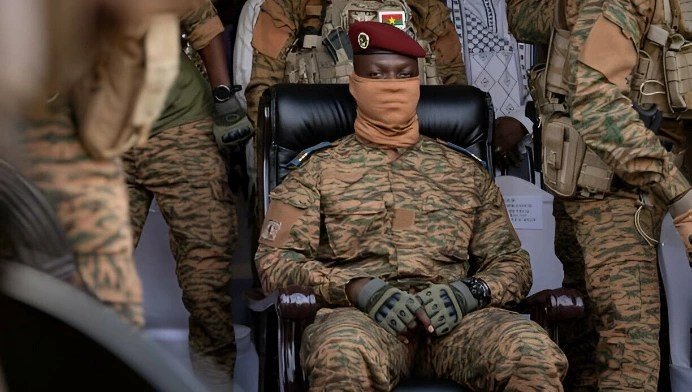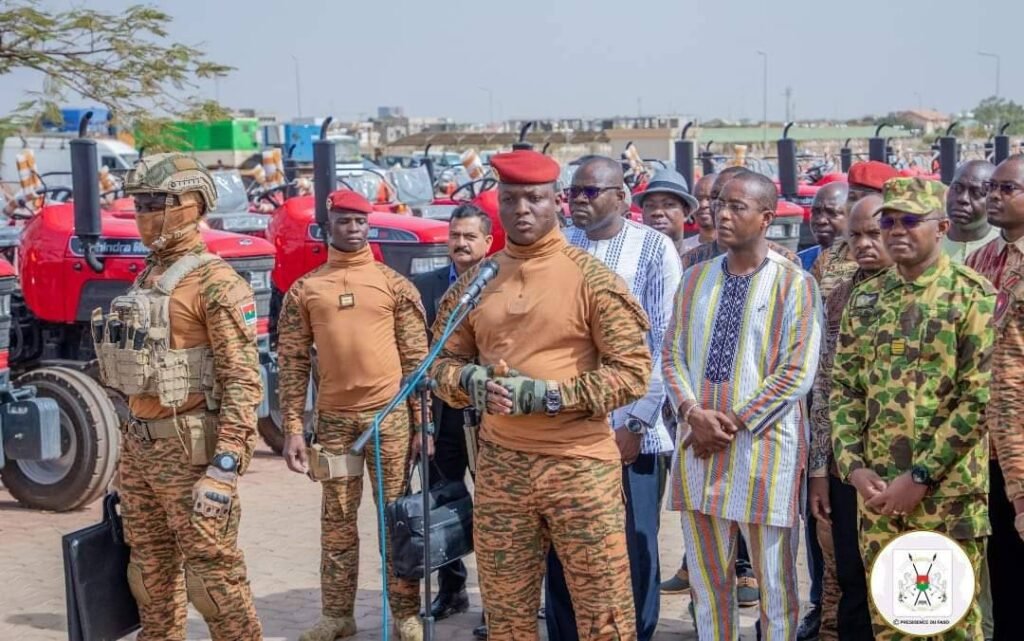A Leader’s Sacrifice: The Story of President Ibrahim Traore
By Venancio Gomani Jr / June 29, 2024 / No Comments / News
In the heart of West Africa, a leader emerged who dared to challenge the status quo. Captain Ibrahim Traore, the President of Burkina Faso, took the reins of his country with a vision of equality and financial responsibility.

Photo courtesy of United States of Africa
Born in 1988, Traore ascended to power by leading a coup on September 30, 2022, ousting the corrupt interim president Paul-Henri Sandaogo Damiba, whom many believed was a puppet leader of foreign powers. Influenced by Marxism and pan-Africanism, he took decisive steps to address the country’s security challenges, particularly the Islamist insurgency that the previous government struggled to manage.
A Salary Revolution
In a bold move, Traore announced significant changes to government salaries as part of his reform agenda. He reduced the salaries of ministers and high-ranking politicians by 30%, aiming to address economic imbalances and promote financial responsibility within the government. This decision was not just a statement, but a testament to his commitment to creating a more equitable society.
Perhaps the most inspiring aspect of Traore’s leadership is his personal sacrifice. Despite holding the highest office in the land, he refused to accept a president’s salary, choosing instead to maintain his military captain’s salary. This act of humility and selflessness is a powerful reminder that leadership is not about personal gain, but about serving the people.
Captain Ibrahim Traore’s actions have not only reshaped Burkina Faso’s economic landscape but also redefined what it means to be a leader. His story serves as a beacon of hope, inspiring leaders around the world to put the needs of their people before their own.
The Bold Move
The dissatisfaction about the situation was highest among younger officers who fought against the rebels at the frontlines. In addition, there were delays in pay for the “Cobra” troops. These events led to the bold decision by President Traore. He refused to accept the salary of the President of Burkina Faso while his ministers donated 5% of their salaries to the war on terrorism. However, the claims that he reduced the salaries of ministers and politicians by 30% and increased the salaries of Civil Servants by 50% are false.
Economic State of Burkina Faso

Photo courtesy of I Love Africa
Burkina Faso is a low-income Sahelian country with limited natural resources. Its economy is based on agriculture and mining, particularly gold. More than 40% of the population lives below the national poverty line. Burkina Faso ranks 184th out of 191 countries in the 2021–2022 HDI report of the United Nations Development Programme (UNDP).
In 2023, the economy is estimated to have grown by 3.2% (0.5% per capita), up from 1.5% in 2022. The services sector, accounting for 48% of GDP, remained the main growth driver, fueled by an expansion of the public sector. Agricultural sector growth was hindered by security challenges, which restricted access to rural areas⁵.
Real GDP is projected to grow 3.7% in 2023 and 3.9% in 2024, less than the 6% average for 2017–19, due to sociopolitical instability and the deteriorating security environment.
Sure, let’s delve into the geopolitical impacts of President Ibrahim Traore’s directive and the public opinion in Burkina Faso.
Geopolitical Impacts
President Traore’s decision to refuse the presidential salary while maintaining his military captain’s salary, and the ministers’ donation of 5% of their salaries to the war on terrorism, has been a significant move.
This decision has undoubtedly sent ripples across the geopolitical landscape. It has set a precedent for other leaders in the region, challenging the status quo of political remuneration and demonstrating a commitment to national security. This move could potentially influence other nations in the region to reassess their salary structures and allocation of resources, particularly towards security and counter-terrorism efforts.
Public Opinion
The public opinion of President Traore is quite diverse. After his trip to Russia in July, Captain Ibrahim Traore received a grand welcome by thousands of Burkina Faso citizens, who had lined up on the streets of the capital, Ouagadougou. His rise to power and his actions have attracted attention both locally and internationally.
However, amid the high praise, some political observers say that Traore has not yet done something concrete for the people of Burkina Faso to draw strong approval. Critics have accused Traore of using the security challenges to try to extend his hold on power. Recent events have prompted questions over his control, and what the Burkinabe government might do to fend off any internal threats.
In conclusion, President Traore’s decisions have had significant impacts both geopolitically and domestically. While his actions have been praised by some, they have also been met with criticism and skepticism by others. It’s clear that his leadership continues to shape the narrative in Burkina Faso and beyond.
Key Takeaways
- Leadership by Example: President Ibrahim Traore’s actions demonstrate a commitment to equality and financial responsibility, setting a new standard for leadership in Burkina Faso.
- Economic Reforms: His decision to reduce government salaries and increase workers’ wages reflects a bold approach to address economic imbalances and reward hard work.
- Personal Sacrifice: Traore’s choice to retain his military captain’s salary instead of accepting the president’s salary is a powerful act of humility and selflessness.
- Inspiration for Change: The story of President Ibrahim Traore serves as an inspiration for leaders worldwide to prioritize the needs of their people over personal gain.
